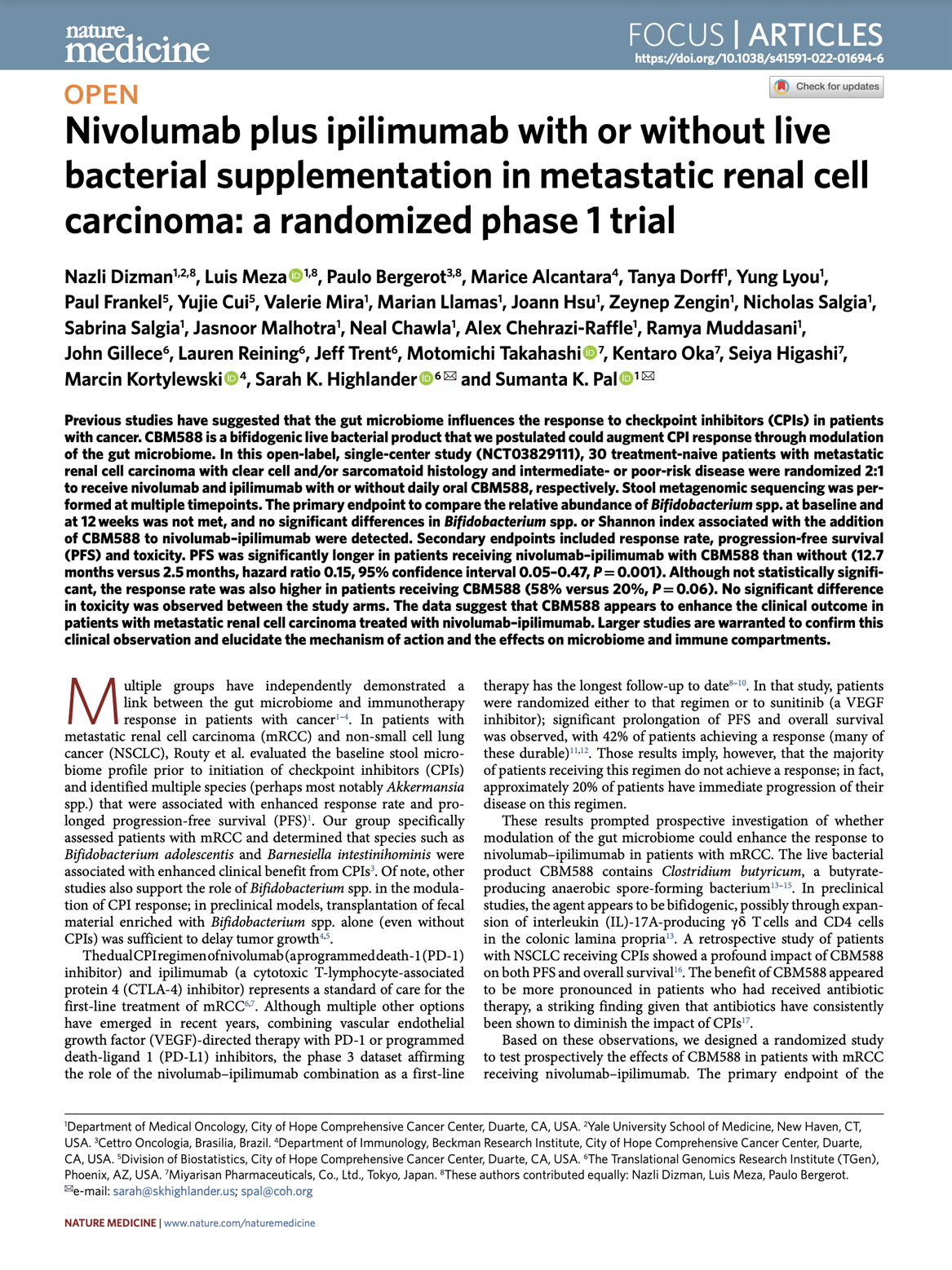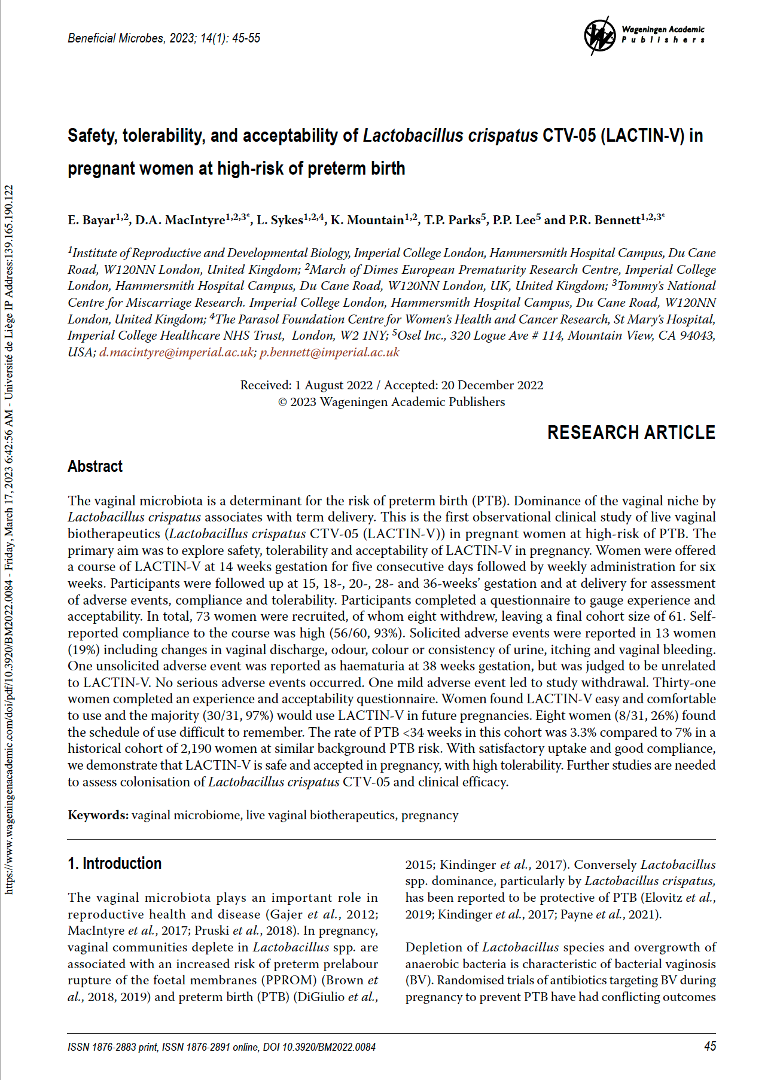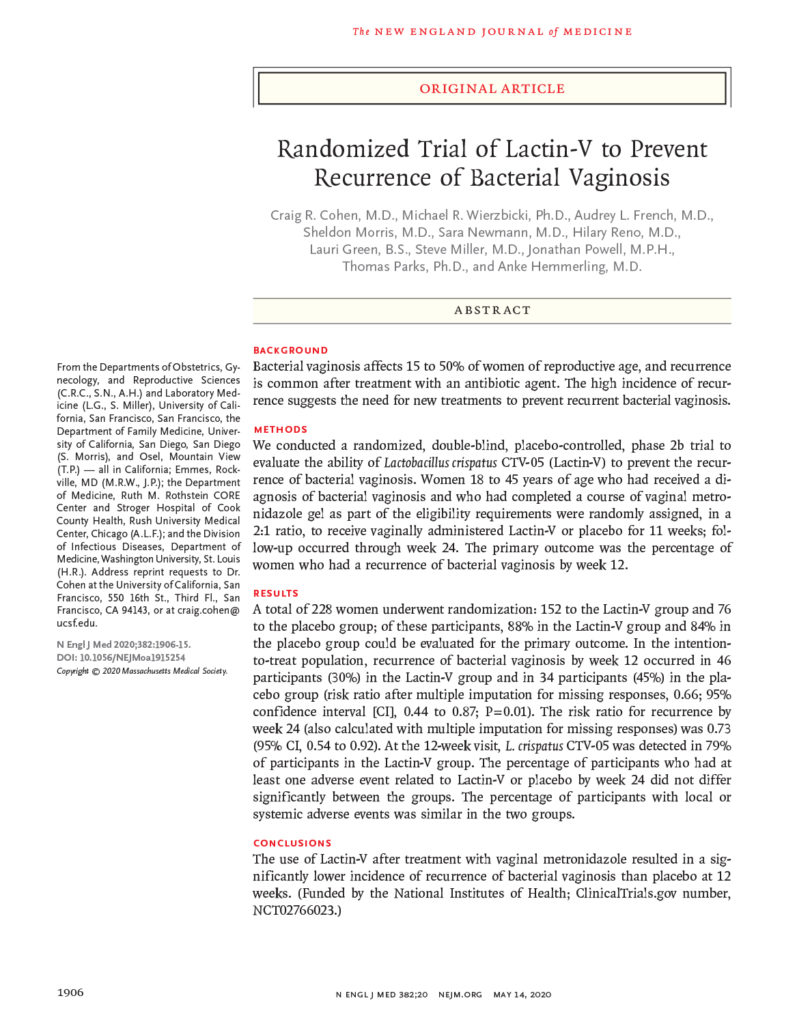Selected Publications – LACTIN-V and CBM588
LACTIN-V Phase 1 study in pregnant women at high risk of preterm birth published in Beneficial Microbes
February 23, 2023
A new article in Beneficial Microbes reported the initial results of a LACTIN-V Phase 1 observational trial in 61 pregnant women at high-risk of preterm birth (PTB). LACTIN-V was shown to be safe, tolerable, and acceptable in this cohort with good compliance. In addition, the rate of PTB at <34 weeks and <37 weeks in women treated with LACTIN-V (Lactobacillus crispatus CTV-05) was approximately one-half the rate of a historical cohort of women at similar background risk of PTB. Lactobacillus crispatus dominance of the vaginal microbiome is known to be associated with term delivery. The study was conducted at Prematurity Prevention Service at Imperial College Healthcare NHS Trust in London, U.K. The study was led by lead author Erna Bayar, and David MacIntyre and Phillip Bennett of Imperial College London, and supported by the March of Dimes European Prematurity Research Centre at Imperial, Tommy’s National Centre for Miscarriage Research, and the Imperial NIHR Biomedical Research Centre. This is the first observational clinical study of a live vaginal biotherapeutic (LACTIN-V) in pregnant women at high-risk of PTB.
February 28, 2022
A new article in Nature Medicine showed that CBM588 significantly improved the outcomes of patients with advanced kidney cancer and undergoing immunotherapy in a Phase 1 study conducted at the City of Hope Comprehensive Cancer Center. The study was led by Sumanta Pal, MD and represents the first randomized study to prospectively assess a live biotherapeutic product in combination with immune checkpoint inhibitors.

LACTIN-V Phase 2b Bacterial Vaginosis Study Published in the New England Journal of Medicine
May 14, 2020
A new article in the New England Journal of Medicine (NEJM) showed that LACTIN-V significantly reduced the recurrence of bacterial vaginosis (BV) in a Phase 2b study conducted at four sites in the U.S. The study was led by Craig Cohen, MD, MPH and Anke Hemmerling, MD, PhD, MPH of the University of California, San Francisco and supported by the National Institutes of Health (NIH). LACTIN-V represents the first microbiome-based drug to significantly reduce the recurrence of BV in an FDA-regulated trial.
read more
Osel and Lactin-V Fertility Study Featured in GEN Magazine
A new article in Genetic Engineering and Biotechnology News (GEN) explores the role of a woman’s vaginal microbiome in infertility. The story features our collaborators in Denmark who have launched a study to determine if Lactin-V could be used to restore a more...
Vaginal Microbiome Could Provide Clues to Pre-term Labor
Subtle changes to the microbiome in the vagina of pregnant women have been tied to pre-term labor in a recent study carried out by the Imperial College London. The study, published in the journal BMC Medicine, highlights the importance of the role of Lactobacillus...
The Atlantic Explores the Scourge of Bacterial Vaginosis
An article in The Atlantic explores the toll of bacterial vaginosis and Osel’s efforts to create the first effective treatment of the harmful infection.
Nature Medicine Article Features Osel
Osel was featured in a recent article in Nature Medicine, “Living therapeutics: Scientist genetically modify bacteria to deliver drugs,” by Amy Maxmen. The article profiles our Director of Research Laurel Lagenaur and her work at Osel to investigate ways to manipulate bacteria to express HIV-inhibiting proteins, and other work to develop LACTIN-V, our live biotherapeutic drug candidate for bacterial vaginosis. Recent research has suggested that women with chronic bacterial vaginosis are more susceptible to HIV.
Bayar E et al., Safety, tolerability, and acceptability of Lactobacillus crispatus CTV-05 (LACTIN-V) in pregnant women at high-risk of preterm birth. Benef Microbes . 2023 Mar 14;14(1):45-55. doi: 10.3920/BM2022.0084
Armstrong E et al., Sustained effect of LACTIN-V (Lactobacillus crispatus CTV-05) on genital immunology following standard bacterial vaginosis treatment: results from a randomised, placebo-controlled trial. Lancet Microbe. 2022 June ; 3(6): e435–e442.
Armstrong E et al., Metronidazole treatment rapidly reduces genital inflammation through effects on bacterial vaginosis-associated bacteria rather than lactobacilli. J Clin Invest. 2022, Feb 3:e152930.
Lagenaur LA et al., Connecting the Dots: Translating the Vaginal Microbiome Into a Drug. J Infect Dis. 2021, 223(12 Suppl 2):S296-S306.
Cohen CR et al., Randomized Trial of LACTIN-V to Prevent Recurrence of Bacterial Vaginosis. N Engl J Med. 2020, 382(20):1906-1915.
Brown RG et al., Establishment of vaginal microbiota composition in early pregnancy and its association with subsequent preterm prelabor rupture of the fetal membranes. Transl Res. 2019 207:30-43.
Kindinger LM et al., The interaction between vaginal microbiota, cervical length, and vaginal progesterone treatment for preterm birth risk. Microbiome. 2017, 5(1):6.
Haahr T et al., Abnormal vaginal microbiota may be associated with poor reproductive outcomes: a prospective study in IVF patients. Hum Reprod. 2016 Apr;31(4):795-803.
Hemmerling A et al., Phase 2a study assessing colonization efficiency, safety, and acceptability of Lactobacillus crispatus CTV-05 in women with bacterial vaginosis. Sex Transm Dis. 2010, 37(12):745-50.
Stapleton AE et al., Randomized, placebo-controlled phase 2 trial of a Lactobacillus crispatus probiotic given intravaginally for prevention of recurrent urinary tract infection. Clin Infect Dis. 2011, 52(10):1212-7.
Ngugi BM et al., Effects of bacterial vaginosis-associated bacteria and sexual intercourse on vaginal colonization with the probiotic Lactobacillus crispatus CTV-05. Sex Transm Dis. 2011, 38(11):1020-7.
Hemmerling A et al., Phase 1 dose-ranging safety trial of Lactobacillus crispatus CTV-05 for the prevention of bacterial vaginosis. Sex Transm Dis. 2009, 36(9):564-9.
Czaja CA et al., Phase I trial of a Lactobacillus crispatus vaginal suppository for prevention of recurrent urinary tract infection in women. Infect Dis Obstet Gynecol. 2007;2007:35387.
Kwok L et al., Adherence of Lactobacillus crispatus to vaginal epithelial cells from women with or without a history of recurrent urinary tract infection. J Urol. 2006 176(5):2050-4; discussion 2054.
CBM588
Tomita Y et al., Clostridium butyricum therapy restores the decreased efficacy of immune checkpoint blockade in lung cancer patients receiving proton pump inhibitors. Oncoimmunology. 2022 May 27;11(1):2081010.
Dizman N, Meza L et al., Nivolumab plus ipilimumab with or without live bacterial supplementation in metastatic renal cell carcinoma: a randomized phase 1 trial. Nature Medicine. 2022, Feb 28. doi: 10.1038/s41591-022-01694-6.
Tomita Y et al., Association of Probiotic Clostridium butyricum Therapy with Survival and Response to Immune Checkpoint Blockade in Patients with Lung Cancer. Cancer Immunol Res. 2020, 8:1236–42.
Hayashi A et at., The Butyrate-Producing Bacterium Clostridium butyricum Suppresses Clostridioides difficile Infection via Neutrophil- and Antimicrobial Cytokine-Dependent but GPR43/109a-Independent Mechanisms. J Immunol. 2021, 206(7):1576-1585.
Hagihara M et al., Clostridium butyricum enhances colonization resistance against Clostridioides difficile by metabolic and immune modulation. Sci Rep. 2021, 11(1):15007.
Ariyoshi T et al., Clostridium butyricum MIYAIRI 588 Modifies Bacterial Composition under Antibiotic-Induced Dysbiosis for the Activation of Interactions via Lipid Metabolism between the Gut Microbiome and the Host. Biomedicines. 2021, 9(8):1065.
Hagihara M et al., Clostridium butyricum Modulates the Microbiome to Protect Intestinal Barrier Function in Mice with Antibiotic-Induced Dysbiosis. iScience. 2020, 23(1):100772.
Ariyoshi T et al., Clostridium butyricum MIYAIRI 588-Induced Protectin D1 Has an Anti-inflammatory Effect on Antibiotic-Induced Intestinal Disorder. Front Microbiol. 2020, 11:587725.
Hagihara M et al., The impact of probiotic Clostridium butyricum MIYAIRI 588 on murine gut metabolic alterations. J Infect Chemother. 2019, 25(8):571-577.
Hagihara M et al., The impact of Clostridium butyricum MIYAIRI 588 on the murine gut microbiome and colonic tissue. Anaerobe. 2018, 54:8-18.
Isa K et al., Safety assessment of the Clostridium butyricum MIYAIRI 588 probiotic strain including evaluation of antimicrobial sensitivity and presence of Clostridium toxin genes in vitro and teratogenicity in vivo. Hum Exp Toxicol. 2016, 35(8):818-32.
Kashiwagi I et al., Smad2 and Smad3 Inversely Regulate TGF-beta Autoinduction in Clostridium butyricum-Activated Dendritic Cells. Immunity. 2015, 43(1):65-79.
Kanai T, Mikami Y, Hayashi A. A breakthrough in probiotics: Clostridium butyricum regulates gut homeostasis and anti-inflammatory response in inflammatory bowel disease. J Gastroenterol. 2015 50(9):928-39.
Hayashi A et al., A single strain of Clostridium butyricum induces intestinal IL-10-producing macrophages to suppress acute experimental colitis in mice. Cell Host Microbe. 2013, 13(6):711-22.
Shinnoh M et al., Clostridium butyricum MIYAIRI 588 shows antitumor effects by enhancing the release of TRAIL from neutrophils through MMP-8. Int J Oncol. 2013, 42(3):903-11.


